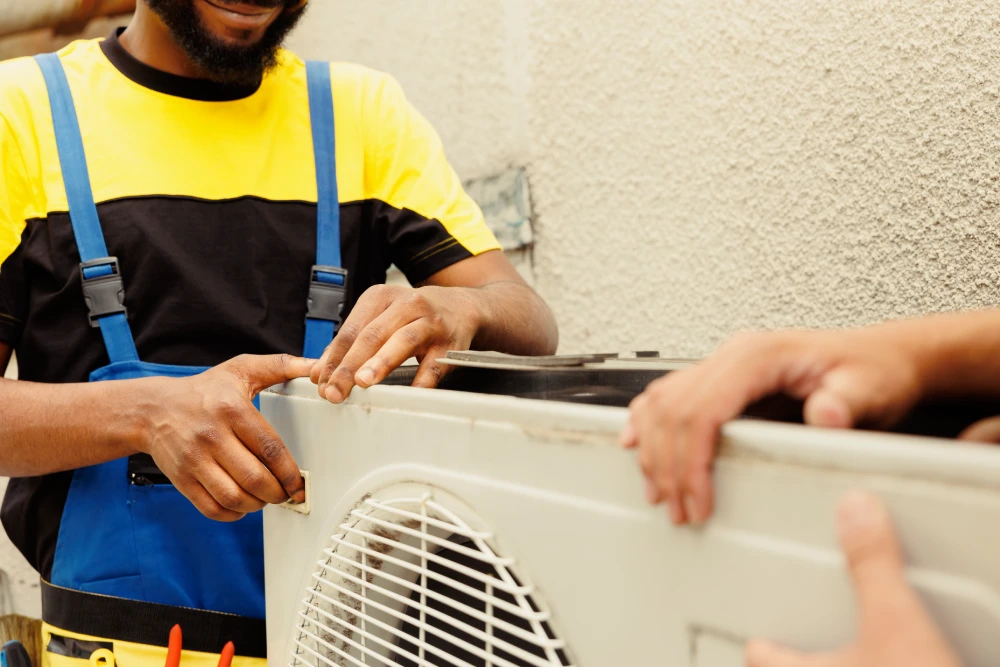The choice to repair or replace an HVAC system is a significant decision for both homeowners and business owners. This choice can greatly impact indoor comfort, energy costs, and overall environmental quality. Many times, individuals responsible for residential or commercial properties find it challenging to decide the best course of action.
Understanding the factors that should influence this decision allows you to make a more informed choice that suits your residential or commercial needs, budget, and long-term objectives for property comfort. This guide helps you understand when to repair or replace your HVAC system by highlighting essential considerations.
What Is an HVAC System?
An HVAC system is crucial for ensuring a comfortable indoor environment by controlling temperature, humidity, and air quality. This includes a range of components such as furnaces, air conditioners, ductwork, and thermostats that work in tandem to maintain desired indoor conditions, applicable to both residential and commercial settings.
Making the Decision: Repair or Replace Your HVAC System
Deciding if you should repair or replace your HVAC system is a significant decision that demands careful consideration of several key factors. Whether it’s for a residential home or a commercial property, here are insights and factors to consider when determining the right path forward for your HVAC needs.
• Evaluate the System’s Age and Expected Lifespan
The age of your HVAC system is a primary factor in determining whether to repair or replace it. The typical lifespan of an HVAC system is between 15 and 25 years. If your system is within this age bracket or older, it may be more cost-effective to invest in a new system rather than spend money on repairs, especially if technological advancements could provide greater efficiency and comfort.
• Assess Efficiency and Operating Costs
Modern HVAC systems are significantly more energy-efficient than older models. If your current system has a low Seasonal Energy Efficiency Ratio (SEER) rating, replacing it with a higher-rated model could reduce your energy bills substantially. Analyze your recent energy bills: if you notice a consistent increase in costs without a corresponding increase in usage, this inefficiency could justify an upgrade.
• Review Repair History and Future Costs
Reflect on the history of repairs and maintenance your system has undergone. Frequent repairs can be a telltale sign that your system is on its last legs. If you’re facing a costly repair, use the 50% rule: if the repair expense exceeds 50% of the cost of a new system, replacement is generally recommended. Also, consider potential future repairs and maintenance—investing in a new system could be more economical over time than continually fixing an old one.
• Consider Comfort and Air Quality
Your HVAC system’s ability to maintain comfortable temperatures and good air quality is crucial. If you experience uneven heating or cooling, excessive humidity, or poor air quality, these issues can often be addressed more effectively with a new, modern system. Newer models offer superior climate control and come with features that can improve overall air quality, enhancing comfort for occupants.
• Look at Technological Advancements and Features
Technological advancements have transformed HVAC systems, which makes them smarter, more efficient, and easier to control. Features like programmable thermostats, zoned cooling and heating, and Wi-Fi connectivity can provide significant improvements to your comfort and control over energy usage. If your current system lacks these modern features, upgrading can offer a more seamless and efficient way to manage your indoor environment.
• Environmental Considerations and Regulations
Environmental impact and regulatory requirements are increasingly important factors in the decision-making process. Older systems might use refrigerants that are less environmentally friendly or even phased out due to regulations. Upgrading to a new system can minimize your carbon footprint and ensure compliance with current environmental laws, which can also impact system effectiveness and costs.
• Financial Incentives and Rebates
Investigate available financial incentives, such as rebates, tax credits, or special financing offers for energy-efficient HVAC systems. These incentives can significantly decrease the cost of a new system, making replacement a more attractive option financially.
• Professional Consultation and Estimates
Before making a decision whether to repair or replace, consult with a licensed and experienced HVAC professional. They can provide a comprehensive assessment of your current system’s condition, performance, and potential remaining lifespan. They can also offer detailed estimates for both repair and replacement, which allows you to make an informed decision according to your individual circumstances and needs.
Repair or Replace Your HVAC System FAQs

Can I replace only part of my HVAC system?
Yes, in certain situations, it’s possible to replace only a part of your HVAC system. For example, if one component, such as the air conditioner or furnace, fails but the other components are still in good condition, you may opt for a partial replacement. However, it’s essential to consult with a professional HVAC technician to assess the feasibility and compatibility of replacing specific parts.
What time of year is the cheapest to repair or replace HVAC?
The off-season, such as spring and fall, are typically the cheapest times to repair or replace HVAC systems. During these times, demand for HVAC services is lower, leading to potential discounts and promotions from HVAC companies. Additionally, scheduling maintenance or replacements during these seasons can help you avoid peak demand times and potential price surges.
Can I replace my HVAC system myself?
While it’s technically possible to replace your HVAC system yourself, it’s not recommended unless you have the necessary expertise and experience. HVAC installation involves complex electrical and mechanical work, along with a thorough understanding of local building codes and regulations. Incorrect installation can lead to safety risks, poor performance, and voided warranties. It’s safer and more reliable to hire a licensed HVAC professional for system replacements.
Conclusion
The decision to repair or replace the HVAC system involves a careful evaluation of its age, efficiency, repair history, comfort levels, technological features, environmental impact, and financial incentives. By considering these detailed factors and consulting with an HVAC professional, you can make a well-informed decision that addresses your immediate needs.
For expert HVAC services, consider reaching out to Tropic-Air Conditioning Inc. We specialize in providing top-notch HVAC solutions for residential and commercial clients. Contact us today for more information.




